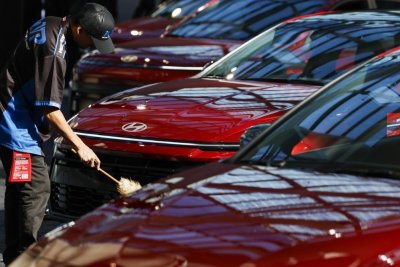Even if U.S. tariffs decrease to 15%, some industries still are likely to suffer, particularly automobiles. Korea is home to Hyundai Motor and its sister company Kia — two of the world’s largest carmakers. File Photo by Caroline Brehman/EPA
SEOUL, Sept. 26 (UPI) — The International Monetary Fund said this week that South Korea’s economy would rebound next year after a sluggish 2025. But concerns linger over the impact of steep U.S. tariffs on Asia’s fourth-largest economy.
According to the IMF, the country’s economic growth is projected to be 0.9% for 2025, less than half of the 2.1% average recorded over the past three years, before recovering to 1.8% in 2026.
“Prolonged domestic political and global trade policy uncertainties have weighed on growth in 2025,” the IMF said in a statement. “Revitalizing domestic demand and diversifying Korea’s export structure will be essential for more resilient growth.”
Seoul recently suffered political turmoil when former President Yoon Suk-yeol was impeached in April after declaring martial law late last year. President Lee Jae Myung was then elected and took office in June.
In addition, the export-driven Korean economy has been hit by the 25% U.S. tariffs, which went into effect in August. Previously, it enjoyed zero or very low duties, thanks to the free trade deal between Seoul and Washington that entered into force in 2012.
The Bank of Korea has expressed less optimism for 2026 than the IMF. In a recent report, the central bank estimated that the U.S. tariff policy would shave 0.45 percentage points off growth this year and 0.6 percentage points next year.
“U.S. tariff policies are predicted to trigger not only short-term economic impacts, but also broader changes in the global trade order and even in domestic and international politics, the economy and industrial structures,” the bank said in its August report.
It warned that exports redirected from other countries to Korea could disrupt local industries, while the expansion of U.S. domestic production might hollow out Korean manufacturing, reduce employment and even spark a brain drain.
The report is based on the understanding that the U.S. tariffs on Korean-made products will drop to 15% in return for Korea’s $350 billion investment pledge in accordance with an agreement in late July.
However, the two sides have yet to agree on details like the exact timeline to apply the 15% tariffs, as working-level negotiations are still underway. Some observers worry that the bilateral talks may fall apart.
“Our businesspeople are desperate to know when the tariffs will be cut, but the discussions between Seoul and Washington appear to be stalled over how to proceed with the investments,” Lee Phil-sang, an adviser at Aju Research Institute of Corporate Management and former Seoul National University economics professor, told UPI.
“I am not sure about whether the two sides will be able to reach a final agreement. Frankly speaking, South Korea may be better off saving $350 billion and continuing under the 25% tariffs. In that case, however, U.S. President Donald Trump may impose even higher tariffs than 25%,” he said.
Lee and his aides voiced frustration, complaining that the United States has demanded too much. To complicate the situation, U.S. authorities detained more than 300 Korean workers at a Hyundai Motor battery plant in Georgia early this month due to visa issues.
Unnerving the Korean society, the measure fueled fears that the country’s companies would not be able to invest properly in the United States without addressing the visa issue.
Even if tariffs decrease to 15%, some industries still are likely to suffer, particularly automobiles. Korea is home to Hyundai Motor and its sister company Kia — two of the world’s largest carmakers.
“Hyundai Motor and Kia have to pay 25% tariffs compared to their competitors in Japan and Europe, which pay only 15%,” Kim Kyeong-joon, formerly vice chairman at Deloitte Consulting Korea, said in a phone interview.
“Because the auto industry is closely tied to many related sectors, its downturn can drag down overall economic performance. That is the biggest headache for us coming from U.S. tariffs,” he said.
According to the Ministry of Trade, Industry and Energy, the country’s carmakers saw their U.S. exports decline for the past six consecutive months. In particular, the year-on-year shipments dipped 15.2% last month.
As a result, Hyundai Motor and Kia expect to lose billions of dollars in operating profits this year.
